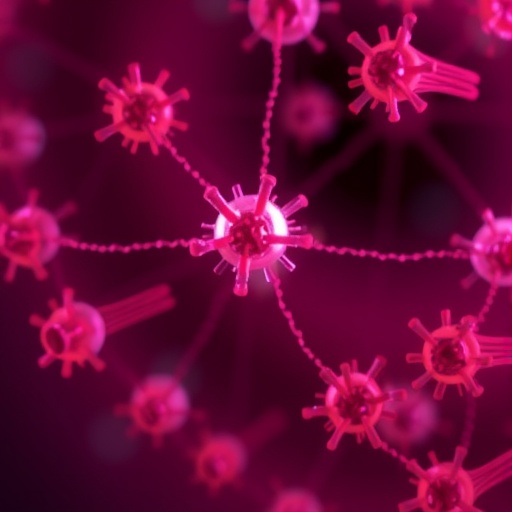In a significant advancement in the field of environmental microbiology, researchers have turned their attention to the cyanobacterium Synechococcus elongatus to explore its genomic responses to environmental stressors, specifically heavy metals and produced water exposure. The implications of these findings resonate within both scientific and industrial contexts, as the data gleaned from the gene expression analysis could potentially redefine our understanding of how micro-organisms adapt to changing ecosystems and anthropogenic influences.
Synechococcus elongatus, a model organism due to its well-characterized genetics, plays an essential role in aquatic ecosystems. Its ability to photosynthesize makes it a critical contributor to global carbon and nitrogen cycles. However, the increasing presence of pollutants in marine environments highlights the urgent need to study how such organisms cope with toxic compounds. In this context, researchers focused on characterizing specific genes that are activated in response to heavy metals and produced water, which are often byproducts of oil extraction processes.
The research executed by Hassanien, Ahmed, Misfud, and their colleagues delves into the intricate relationship between environmental stressors and gene regulation. Gene expression is a crucial mechanism through which organisms can adapt and survive in hostile environments. By analyzing the expression of genes in Synechococcus elongatus under heavy metal and produced water exposure, the team aimed to identify which genes were upregulated in response to these pollutants. This knowledge not only sheds light on the stress response mechanisms but also contributes to broader ecological understanding.
The findings suggest that certain genes related to metal ion transport and detoxification were significantly expressed when exposed to heavy metals. This indicates that Synechococcus elongatus has evolved specific molecular pathways to mitigate the adverse effects of toxic metals such as lead, cadmium, and arsenic. The induction of these pathways suggests a sophisticated level of adaptive response that may offer insights for bioremediation strategies, where organisms can be employed to clean up contaminated environments.
Furthermore, the presence of produced water—an effluent byproduct of oil and gas extraction—adds another layer of complexity to the resilience of marine microorganisms. The researchers noted unique gene expression patterns in the presence of produced water components, suggesting that Synechococcus elongatus can actively sense and respond to a cocktail of pollutants. Understanding these dynamics provides pivotal information for assessing the ecological impact of oil spills and industrial discharges on aquatic health.
The implications of this research extend beyond mere observation; they promise potential applications in environmental management and biotechnology. By unraveling the genetic mechanisms underlying stress responses in Synechococcus elongatus, scientists can explore the potential for harnessing these natural processes in pollution bioremediation efforts. For industries involved in resource extraction, the knowledge gained here adds a layer of ecological responsibility, advocating for cleaner practices and the protection of vital aquatic ecosystems.
Moreover, as scientists continue to uncover the resilience and adaptability of microorganisms, they underscore the importance of these organisms in sustainable environmental practices. The research team’s exploration into the molecular responses of Synechococcus elongatus adds a significant piece to the puzzle in understanding how life not only survives but thrives amidst adversity. Such knowledge is particularly relevant as climate change and pollution intensify, posing new challenges to ecosystems worldwide.
The research methodology involved a comprehensive approach that utilized sophisticated genomic techniques, enabling the researchers to track gene expression levels accurately under different experimental conditions. This methodological framework serves as a reference for future studies aiming to explore similar environmental stressors. Moreover, this work sets a benchmark for the systematic investigation of other microbial models, potentially unveiling a spectrum of responses across varied species.
As the environmental crisis intensifies, studies such as this illuminate pathways toward sustainable solutions, showcasing how we might leverage biological organisms to mitigate anthropogenic effects on ecosystems. Whether through further investigation into the genomic landscape of Synechococcus elongatus or by applying these insights to bioremediation techniques, the future of our environmental approaches looks promising.
In conclusion, the work done by Hassanien, Ahmed, Misfud, and their collaborators emphasizes the importance of understanding genomic responses to pollution. Synechococcus elongatus appears to be a key player in the biological response to heavy metals and produced water, with implications that resonate across ecological and industrial domains. Continued research in this area will not only enhance our understanding of microbial resilience but will also inform the future course of environmental management strategies.
As we advance into a new era of environmental consciousness, this research serves as a vital reminder of the interconnectedness between human activities and marine health. With the knowledge gained from gene expression analysis in Synechococcus elongatus, we are one step closer to devising more effective methods for preserving our natural resources and ensuring a sustainable future.
Subject of Research: The gene expression analysis of Synechococcus elongatus in relation to heavy metals and produced water exposure.
Article Title: Gene expression analysis reveals genes related to heavy metals and produced water exposure in Synechococcus elongatus.
Article References:
Hassanien, A., Ahmed, N., Misfud, B. et al. Gene expression analysis reveals genes related to heavy metals and produced water exposure in Synechococcus elongatus.
Int Microbiol (2025). https://doi.org/10.1007/s10123-025-00715-x
Image Credits: AI Generated
DOI: https://doi.org/10.1007/s10123-025-00715-x
Keywords: Synechococcus elongatus, gene expression, heavy metals, produced water, environmental microbiology, bioremediation.




